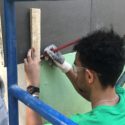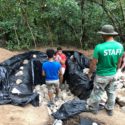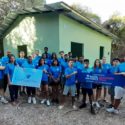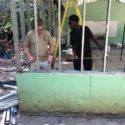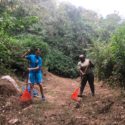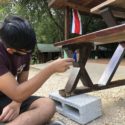Expedition Barra Honda
Aim: To witness and embrace one of the worlds most amazing biodiverse environments and the culture within. To embark on a life-changing adventure and to construct a conservation education facility – working closely as a team whilst overcoming the challenges given from such a harsh secluded environment
A vision..
In 2019, 282 (East Ham) and 338 (West Ham) Squadron embarked on an adventure to help preserve some of our most precious habitats and assist in spreading the importance of conservation. The success of this expedition was huge and the cadets made a positive impact on the local area through conservation research and the construction of a vital education facility in the Barra Honda National Park.
The initial idea was developed by one of the cadets who suggested that they do ‘something good and different’ for the climate crisis and destruction of vital habitats. The Officer Commanding of 282 has inspired many cadets to help those in need both in the UK and overseas through various programmes over the last 12 years. Under the umbrella of the Royal Air Force Air Cadets with its aim to ‘foster the spirit of adventure and develop qualities of leadership and good citizenship’, the OC wishes to give cadets the same opportunities that he was lucky to be given when he was a teenager that helped shape his life.
From the success of previous expeditions, the squadron vowed to give fantastic opportunities again to more young people from East London and equip them with life skills – a sense of community, teamwork, volunteering, opening their eyes to a different (and very interesting) culture, to name just a few.
On a cold evening in December 2018, the next challenge was announced at 282’s Squadron Dinner at the Royal Air Force Club and soon after was put to paper. December 2019 would see one of the most adventurous and eye-opening expeditions the Squadron has undertaken.
The destination..
Costa Rica is ranked one of the world’s happiest countries and is known as a ‘Blue Zone’, meaning its inhabitants commonly live active lives past the age of 100. There is no army, navy, or air force in Costa Rica and the money that would be spent on armed forces is diverted to building facilities providing renewable energy. Costa Rica generates more than 99% of its electricity using renewable energy, which is amazing for a country that contains 5% of the world’s biodiversity.
The destination of the expedition and project work was the Barra Honda National Park, a dry rain forest environment that sits around 400ft above sea level and about 180km from the capital city, San Jose. Riddled with creepy crawlies, unusually large bugs and reptiles, along with different species of monkey, the Barra Honda area is a harsh habitat with two distinct seasons – wet and dry. Temperatures can reach over 40°c in the dry season and wild forest fires are common.
This was an expedition that required will-power and determination as the humidity was very high. The secluded environment would most certainly test the team to its max and provide skills and memories to last a life time.
Building up to the expedition..
Selection and Training
The Squadron received a good interest from cadets and volunteers. With over 110 cadets attending from 282 Squadron and 30 from 338 squadron, selection was hard. Interviews and a selection day whittled down the lucky cadets chosen. Cadets attitude to training and completing the expedition were reviewed.
Cadets and staff attended a mixture of training days and weekends to cover areas such as charity/community work, fitness, medical arrangements and teamwork.
The training days were also set aside for administration work, planning the charity work in detail and coordinating fundraising efforts. Days at the Thames Cleanup and Stubbers Adventure Centre helped a great deal. The weekend residential training sessions concentrated more on leadership tasks, team work and fitness.
The expedition was in jungle/rain forest terrain so the team took part in many walks and activities in the height of the British summer in an attempt to adjust to higher temperatures similar to that of Costa Rica. However it was difficult to train for the humidity! During weekends at Crowborough during July, along with areas of Wales the same month and in August, the cadets worked hard to prepare for their overseas expedition.
The cadets nominated a Team Leader (cadet) and Deputy (cadet) for the charity/community aspect of the expedition. These cadets coordinated the work on the project both in the UK and Costa Rica, along with assigning duty teams for the project work, whilst in Costa Rica. Each session finished with a ‘team bonding’ event and diary time.
Fundraising
This was a difficult one! An expedition over 5,400 miles away from the UK wasn’t going to be cheap, like any expedition. Flights, training, fundraising (some events cost money to do!), kit, coaches, accommodation, hire of local personnel and the community project all added to the bill. In total, each member would have to make a personal contribution of around £500. After the personal contribution, on average the team members (cadets and staff) had to raise at least £1,500 each, not including grant support. The cost would include everything except spending money.
The majority of the funds were donated by means of grants. We are grateful for the support of The Jack Petchey Foundation, The Ulysses Trust, The RAF Charitable Trust, The Mercury Foundation, UK Power Networks and a kind donation from a Liveryman at the Worshipful Company of Plaisterers.
Fundraising activities that the cadets/staff took part in include:
– Community bag packs
– Assisting at London sporting events such as the Colour Run,
– Prudential Ride London, London Triathlon and more
– Assisting with the refurbishing of a pet cemetery in Ilford
– Car boot sales
– Krispy Kreme sales
– Cleaning event spaces
It was tight, however we met the fundraising goal a month before the expedition took place. Everyone met their target and all helped each other get there. It was a fantastic team effort with over £35,000 raised! An amazing achievement.
The construction project..
The team wanted to embark on a different type of expedition, that of environmental importance. Following the vast wildfires of Brazil and the destruction of vital habitats across the globe, the cadets wanted to undertake a task that would help the wildlife and environment.
Barra Honda National Park contains a great variety of wildlife and vegetation that, along with other national parks in Costa Rica, contributes to the 5% of the global biodiversity based in Costa Rica. Its importance is huge and the need to educate visitors and locals is one of the country’s priorities.
The team, along with senior members of the park, decided to construct an educational facility to educate people on the need and importance of national parks.
The foundations were laid prior to the team’s arrival. Tasks the team assisted with were:
- Construction of the ceiling using recycled plastic
- Installation of electrical cables, sockets and LED lighting
- Installation of the sewage filtration system
- Installation of battens and plasterboards
- Plastering of the internal/external walls
- Painting of internal and external walls
- Landscaping of surrounding area
- Construction/refurb of benches
- Painting the fire truck/emergency service hut
All the above was completed in eight days. Each day had a minimum of six personnel working, this was to ensure everyone was gainfully tasked. The rotation also permitted every team member to have a go at each part of the construction work, as opposed to certain personnel sticking to one construction task.
In total:
The team painted a total area of 450m²
The team varnished a total area of 175m²
A total time of 90 hours was spent on construction.
The conservation project..
In addition to the construction element of the expedition, the National Park provided opportunities for research and learning.
The construction work was limited with space and for Health & Safety reasons not everyone could be on site at once. Although there was plenty of work too, flooding the site with personnel wouldn’t have helped.
Team members had the opportunity to undertake:
- Butterfly research a) with hand traps b) with fruit traps
- Monkey research
- Community work – Cleaning of side roads and training locals
- Track/fire break cleaning
- Bat research
Each day, teams would walk into the national park with Park Rangers either catching butterflies or sighting monkeys.
Using large nets, cadets would use certain techniques to catch butterflies that would then be analysed and recorded. If it was a new species, it was taken back to the lab for further analysis. The team also placed food traps to catch butterflies. Butterflies are the main pollinators in this part of the world and research helps to maintain their numbers to see if climate change is pushing them to other areas.
Similar tasks were undertaken with monkeys, although they were never caught. Analysing species, their movements and reproduction rates helps to ensure their numbers remain constant.
The team didn’t get too involved with the bat conservation work due to the high risk of diseases and infections, however a biologist demonstrated the work to the team and the importance of bat research, as they consume fruits/seeds throughout the rain forests and their faeces help spread seeds. The rainforests are mainly created through the spread of bat faeces (Guano) as its packed with fertiliser.
The team carried out the following work on butterflies:
- Butterfly hand traps captured 98 individuals
- A total of 55 species were caught
- The team walked a total of 68 kms combined
- The team walked a combined total of 28 hours.
The team carried out the following work on monkeys:
- 82 Aloutta Palliata species sighted
- 22 Cebus Imitator species sighted
- Total of two monkey species sighted
- 24 combined hours spent on monkey conservation
- A total of 68kms walked on sighting trips.
To encourage locals to look after their beautiful country, the teams walked around the local villages picking up rubbish and enlightening people on the importance of recycling. In total, 216kg of rubbish was collected over four days, which was sifted and recycled by the park.
Some quotes from the cadets/staff:
“I really enjoyed the team training days. It got us to work together more and really got us excited for the big adventure ahead.”
Cadet Corporal Gauri Shaji“I’m very proud of what I have achieved by going out there. I could never have imagined that I would be carrying out construction and conservation projects like this.”
Cadet Corporal Nicole Mosquera“The wildlife was amazing. I couldn’t believe the diversity of the wildlife. Helping with research taught me a great deal about helping our wildlife.”
Cadet Meenakshi Shaji“With forest fires destroying large areas around the globe, being able to maintain firebreaks and survey the amazing wildlife was a humbling experience.”
Pilot Officer Michael Shirley RAFAC“I am not sure what my expectations were of Costa Rica before I went. It was a real eye-opener for me, to see how we are damaging our planet and the importance of recycling and preserving our planet. The community project was worthwhile.”
Cadet Sergeant Timothy Jeyamani“The moment I heard an expedition to Costa Rica was taking place, I wanted to get involved! More so that I wanted to be part of a conservation project. Additionally, it was over Christmas! What an amazing experience that was. I will never forget the trip.”
Cadet Warrant Officer Zuzanna Zapart“I was lucky enough to go to Ghana in 2017 with the squadron. With the opportunity to go to Costa Rica, I wanted to take part in a construction project again. I come from South America and I know how important the rain forests are and how people in the local area need help to maintain the rain forests. I loved every part of the trip, was just so inspiring and motivating.”
Cadet Flight Sergeant Andrew Correa“Going from the city to the remoteness of the Barra Honda Wilderness, there was a clear sense of eagerness and determination from the cadets to make a positive change. The effort leading up to the trip was fantastic and nothing I have seen before; from fundraising to training I knew it was going to be a successful trip. Fundraising is no easy task, but as a team they raised over £35,000 in under nine months! That certainly demonstrates their effort.
“Venturing out of their comfort zone, it was going it be a big adventure for them which is what it is all about! We had the perfect team to make that change – To complete a community and conservational project.
“The Barra Honda expedition will be one that the team will never forget. It was tough, it was demanding, it was hot, but it brought the best out of the team and brought tears with it. They stamped their mark on the happiest country in Latin America and put forward the best of the RAF Air Cadets. Finally, they helped save lives, both mankind and animals. Barra Honda expedition team has signed off.. till next time.”
Squadron Leader Chris Booty RAFAC
On behalf of the team, we would like to thank the following:
All at Projects Abroad for making this trip possible and ensuring the team had a project.
Squadron Leader Mike Blakey, MBE – Headquarters RAF Air Cadets
A kind donation from a Liveryman at the Worshipful Company of Plaisterers
The Mercury Foundation (Grant)
RAF Charitable Trust & The Ulysses Trust (Grant)
The Jack Petchey Foundation (Multiple grants)
UK Power Networks (Training Grants)
Krispy Kreme Doughnuts
The Ulysses Trust also wish to thank the generosity of the Royal Air Force Charitable Trust for supporting this expedition. www.rafct.com

